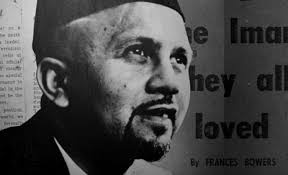Spirituality Reflected Through Activism – By Shaykh Sadullah Khan
In this article, Shaykh Sadullah Khan deeply reflects on the life of Imam Abdullah Haron RA. Imam Abdullah Haron RA was a South African scholar, community leader, and political activist who stood against the apartheid regime in South Africa. He was martyred during his incarceration under the apartheid regime.
* The original source of this article is from the Muslim Views (March 2019):
http://muslimviews.co.za/wp-content/uploads/2019/03/MV-March-2019-LoRes.pdf
 Hafidh-ul-Quran at 14, Imam at 31, Martyred at 45: ash-Shaheed Imam Abdullah Haron.
Hafidh-ul-Quran at 14, Imam at 31, Martyred at 45: ash-Shaheed Imam Abdullah Haron.
Having lost his mother in infancy, reared lovingly by his dear aunt Mariam and tutored in Makkah by the likes of Shaikh Abdurrahman al-Alawi al-Maliki, all impacted on the spiritual roots of this noble icon in our historic struggle against racism and injustice in South Africa.
As one who loved to constantly recite the Quran, as one who fasted every Monday and Thursday, Imam Haron’s spiritual consciousness demanded of him that he engage the world around him in a proactive manner.
As imam and spiritual leader of Al-Jamia Mosque (Stegman Road), in Claremont, he promoted youth programmes, initiated adult male and female classes, organised study circles and encouraged women to participate in the mosque’s executive activities.
He created discussion groups, established the progressive Claremont Muslim Youth Association, publishing the monthly bulletin Islamic Mirror, co-founded and edited the community newspaper Muslim News and, through these, he addressed spiritual, cultural, religious, social and political issues.
All of these played a functional role in engaging the community, informing the community, binding the community and enlightening the community.
Imam Haron’s spirituality was informed by the Quran, which imbued his life with clarity of moral purpose, and was exercised through social engagement rather than withdrawal from society. His moral depth and spiritual strength was evident in:
- his fiery determination in standing up and publicly denouncing the apartheid state when his peers were cowed by the racist government. And it was highly uncommon for religious people to engage in ‘politics’ because it was neither socially safe nor politically correct to do so;
- his preference was to walk the walk rather than talk the talk, living his ideals in practice by active involvement with all strata of civil society rather than sermonising and projecting beautiful visions and solutions without practical implementation;
- his stand when the Group Areas Act threatened Al-Jamia mosque by forced removals. He said, ‘The precincts of the mosque are inviolable and the building sacred forever. No mosque can be sold or destroyed.’
- his active involvement with the Defence and Aid Fund to assist freedom fighters, political prisoners, exiles, those who were banned and their families (who were often forgotten);
- his ethical commitment to physically go and uplift the impoverished through personal interaction despite laws that were designed to keep people apart; so much so that even those not of his faith recognised his spiritual stature by calling him ‘mfundisi’ (holy/ religious man);
- his physical ability, enormous courage and selfless dedication to endure harassment, interrogation, torment and torture for 123 days (even till death) without ‘selling out’ to the notorious brutality and power of the oppressors.
Imam Haron’s activism personified the ethical message of the Quran that he had memorised. Bearing witness (shahadah) is the foundation of spiritual life and Imam Haron lived the Shahadah and died a shaheed (martyr).
A martyr is never defeated nor conquered; they killed his body but his mission is alive. They silenced his voice but his message continues to inspire. His body lies buried but his spirit lives on; it lives in every person he taught and helped (young or old, male or female), in every poor home he visited (in Bonteheuwel or Langa), in every life he touched (Muslim or not).
The pain of his death and the memory of his martyrdom should evoke a moral responsibility on our collective conscience to ensure that the blood of martyrs is never spilled in vain.
Biography of Shaykh Sadullah Khan
Shaykh Sadullah Khan memorized the Qur’an at the age of eight, studied law in South Africa, journalism in Britain and Islamic studies in Egypt. He has spearheaded youth development programs in South Africa and the USA for two decades; has been an inspiring religious leader, motivational speaker and an educator for the past 25 years. Shaykh Sadullah is currently the COO of the Islamia College, in Cape Town, South Africa.
